新编实用英语综合教程1第四版Unit4【精品PPT】
- 格式:ppt
- 大小:4.06 MB
- 文档页数:84
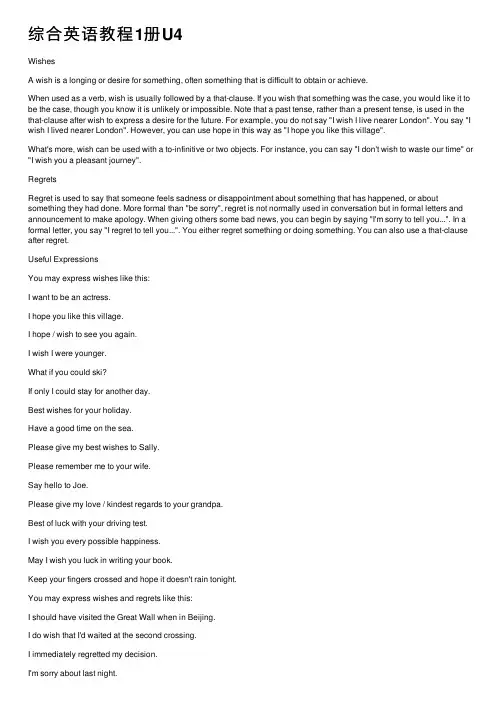
综合英语教程1册U4WishesA wish is a longing or desire for something, often something that is difficult to obtain or achieve.When used as a verb, wish is usually followed by a that-clause. If you wish that something was the case, you would like it to be the case, though you know it is unlikely or impossible. Note that a past tense, rather than a present tense, is used in the that-clause after wish to express a desire for the future. For example, you do not say "I wish I live nearer London". You say "I wish I lived nearer London". However, you can use hope in this way as "I hope you like this village".What's more, wish can be used with a to-infinitive or two objects. For instance, you can say "I don't wish to waste our time" or "I wish you a pleasant journey".RegretsRegret is used to say that someone feels sadness or disappointment about something that has happened, or about something they had done. More formal than "be sorry", regret is not normally used in conversation but in formal letters and announcement to make apology. When giving others some bad news, you can begin by saying "I'm sorry to tell you...". In a formal letter, you say "I regret to tell you...". You either regret something or doing something. You can also use a that-clause after regret.Useful ExpressionsYou may express wishes like this:I want to be an actress.I hope you like this village.I hope / wish to see you again.I wish I were younger.What if you could ski?If only I could stay for another day.Best wishes for your holiday.Have a good time on the sea.Please give my best wishes to Sally.Please remember me to your wife.Say hello to Joe.Please give my love / kindest regards to your grandpa.Best of luck with your driving test.I wish you every possible happiness.May I wish you luck in writing your book.Keep your fingers crossed and hope it doesn't rain tonight.You may express wishes and regrets like this:I should have visited the Great Wall when in Beijing.I do wish that I'd waited at the second crossing.I immediately regretted my decision.I'm sorry about last night.I regretted not leaving the key to my friend.I'm sorry to tell you this, but you fail to enter the second round.ConversationUseful Expressionsring sb. up: make a phone call to sb.Mary didn't ring me up last night.Cf. ring up ring call phoneRing: When you ring someone, you dial their phone number and speak to them by phone. You can say that someone ring s a place.I rang Aunt Jane this evening.You must ring the hospital at once.Ring up: In conversation, people often use ring up, instead of ring. There is no difference in meaning. Note that you do not use "to" after ring or ring up.He had rung up Emily and told her all about it.Call: American speakers do not say that one person rings another. The word they use is a call. Some British speakers also say call.Phone: When you phone someone, you dial their phone number and speak to them by phone. You can also phone a place. Note that you do not use "to" after phone.I went back to the motel to phone Jenny.He phoned the police station and speak to the officer in charge.Main IdeaThis text is written in a style called "stream of consciousness", or "interior monologue", in which a character's inner thoughts, impressions, and memories are dictated as if directly overheard without the obvious interruption of a summarizing and selecting narrator. Such a style emphasizes the unbroken record or continuous flow of a character's sense-perceptions, thoughts, feeling and memories by abandoning strict logic, syntax and punctuation. In this text, the girl's thoughts and feelings are expressed exactly as they pass through her mind rather than being ordered in a way that usually appears in novels. The first-person narrator "I" not only presents the girl's tension and emotion in a vivid, realistic way but also encourages the readers to share the girl's worry and concern. The use of short, choppy sentences also contributes to describing the girl's restlessness.本⽂采⽤了"意识流"或"内⼼独⽩"的写作⽅式,即将⼈物内⼼的思想、印象、记忆⼀⼀录写出来,避免⽤明显的叙事者总结或转换等⼲预⼿段。
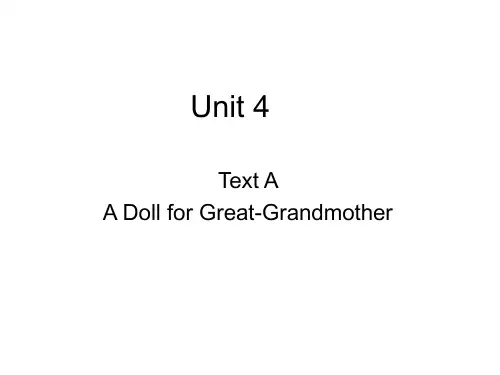
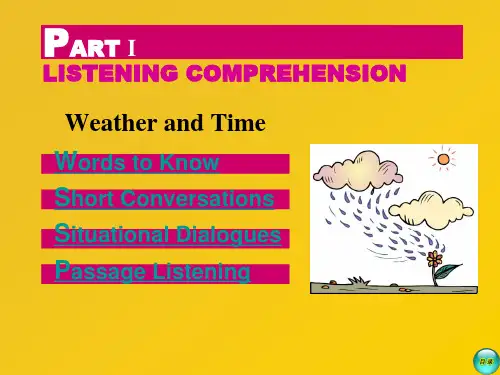
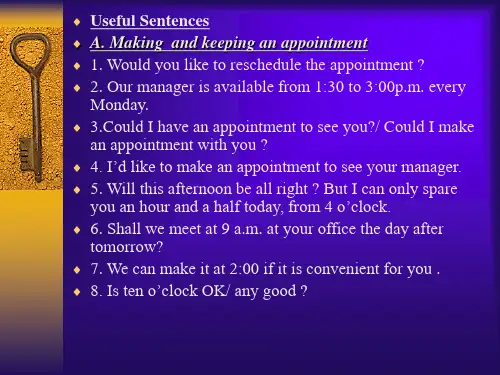
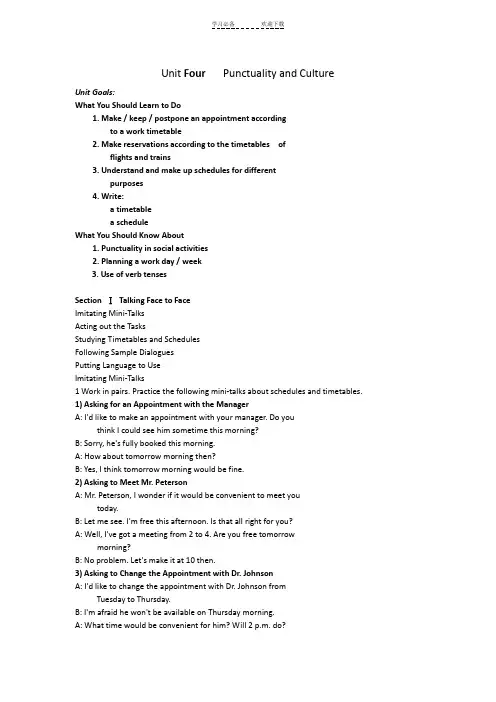
Unit Four Punctuality and CultureUnit Goals:What You Should Learn to Do1. Make / keep / postpone an appointment accordingto a work timetable2. Make reservations according to the timetables offlights and trains3. Understand and make up schedules for differentpurposes4. Write:a timetablea scheduleWhat You Should Know About1. Punctuality in social activities2. Planning a work day / week3. Use of verb tensesSection ⅠTalking Face to FaceImitating Mini-TalksActing out the TasksStudying Timetables and SchedulesFollowing Sample DialoguesPutting Language to UseImitating Mini-Talks1 Work in pairs. Practice the following mini-talks about schedules and timetables.1) Asking for an Appointment with the ManagerA: I'd like to make an appointment with your manager. Do youthink I could see him sometime this morning?B: Sorry, he's fully booked this morning.A: How about tomorrow morning then?B: Yes, I think tomorrow morning would be fine.2) Asking to Meet Mr. PetersonA: Mr. Peterson, I wonder if it would be convenient to meet youtoday.B: Let me see. I'm free this afternoon. Is that all right for you?A: Well, I've got a meeting from 2 to 4. Are you free tomorrowmorning?B: No problem. Let's make it at 10 then.3) Asking to Change the Appointment with Dr. JohnsonA: I'd like to change the appointment with Dr. Johnson fromTuesday to Thursday.B: I'm afraid he won't be available on Thursday morning.A: What time would be convenient for him? Will 2 p.m. do?B: Yes, that'll be fine.4) Asking About the Working Hours of a Ticket OfficeA: What are the office hours?B: Well, the office hours are from 9 a.m. to 6 p.m.A: Do you work on weekends?B: On Saturday the office is open from 9 a.m. to 3 p.m., but on Sunday we are closed.5) Asking About the Flights for MacaoA: Do you have flights to Macao?B: We have only one flight to Macao each week, at 1:40 p.m.Wednesday.A: When does it arrive in Macao?B: At 3:40 p.m.2 Work in pairs and act out the tasks by following the above mini-talks.1 Task:Look at the flight timetable in Exercise 3.Ask about the departure and arrival time2 Task:Look at the flight timetable in Exercise 3.Ask about the Tuesday flight for Hong Kong3 Task:Look at Mark's schedule in Exercise 3.Call to ask Mark for a change of an appointment.4 Task:Look at Mark's schedule in Exercise 3.Ask to make an appointment to see Mark on Wednesday.5 Task:Look at Mark's schedule in Exercise 3.An old friend in Hong Kong asks to see Mark on Thursday.Studying Timetables and SchedulesRead the following sample dialogues and try to perform your own tasks.Putting Language to UseSpeak and CompleteMark: Miss Wang, I want to 1 __________ an evening train to Harbin so thatI can get there the next morning. Do you know the schedule?Miss Wang: Yes. I have got a 2 __________________ here.Mark: Is there a train leaving around 6?Miss Wang: 3 ______________ one at 6:15.Mark: When will it get there?Miss Wang: 4 ______________ at about 8 next morning.Mark: That's the one I need. Thank you very much.Miss Wang: You are 5 ______________.SECTION II Being All EarsLearning Sentences for Workplace CommunicationHandling a DialogueUnderstanding a Short Speech / TalkLearning Sentences for Workplace Communication1 Listen to 10 sentences for workplace communication cross-referenced withtheir Chinese translations.arrange 安排confirm 确认due 规定(到达) 的delay 耽搁2 Listen to the following sentences for workplace communication in Column A andmatch each one with its Chinese version in Column BKey:1-i, 2-j, 3-d, 4-c, 5-f, 6-e, 7-h, 8-g, 9-a, 10-b3 Listen to 6 sentences for workplace communication and choose their right responses4 Listen to a dialogue and decode the message by filling in Susan's scheduleaccording to what you have heard.5 Now listen to a short speech / talk and fill up the blanks according to what youhave heard. The words in brackets will give you some hints.6 Listen to the speech / talk again and complete the information in Column A withthe right choices in Column B.SECTION III Trying Your HandPracticing Applied WritingWriting Sentences and Reviewing Grammar1 Fill in the office hours making use of the information in the passage that follows.2 Translate the following schedule into English, using the data bank in theWorkbook for reference.Writing Sentences and Reviewing Grammar3 Complete the following sentences, using the right verb forms4 Correct the errors in the following sentences.5 Translate the following sentences into English6 Suppose this is your schedule for the coming three days. Write a paragraph ofabout 100 words based on the information given in the schedule. You maystart the passage with the sentence: I've got a very busy schedule.KEYS: I've got a very busy schedule. I'm catching the 9:45 flight on October 8 and arriving in Shanghai at 2:00 in the afternoon. Bob is meeting me at the airport. I will check into Beach Hotel and have a rest there in the evening. On October 9, I'm meeting Mrs. Black at 10:15 a.m. and after having lunch at Beach Hotel we're visiting the plant at 2:30 p.m. The next day I'm attending a conference at 9 a.m. I'm leaving Shanghai in the afternoon. I'm taking a flight at 3:30 p.m. and arriving back at 7:45 p.m. Phillip will be there to pick me up at the airport.SECTION IV Maintaining a Sharp EyeInformation Related to the Reading PassageAmericans and Europeans consider time to be an asset that can be spent and saved; therefore, proper scheduling of time and its appropriate allocation to various competing tasks is an important part of organizational management. Variations in time use are expected to influence performance and stress, as well as other outcomes. It is a vital strategic element. Thelarge amount of management processes and methods developed to improve performance by managing time use proves the importance placed on time. Here are a few famous quotes and sayings about time and punctuality:1 Explanation of Difficult Sentences1. (Para. 1) One of the cultural differences that tend to annoy Americans has to dowith understanding of punctuality.Analysis: Has to do with is a phrase meaning has a specified relationship with.It is the predicate of the sentence. That introduces a restrictive relativeclause modifying differences.Translation:有一种常会惹恼美国人的文化差异可能关系到对守时的不同理解。
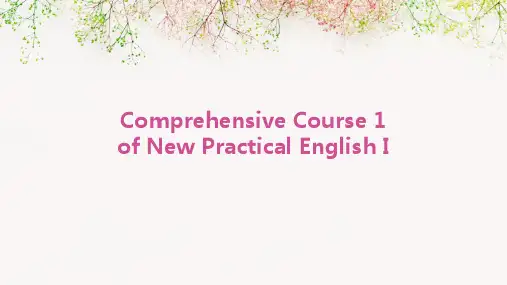
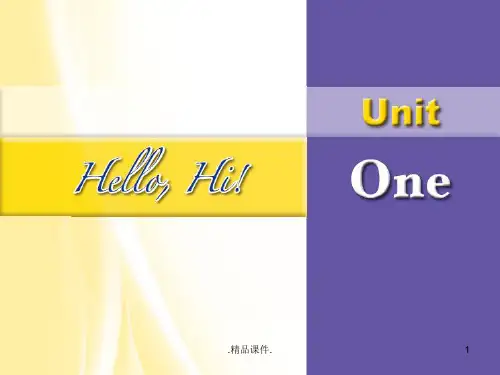


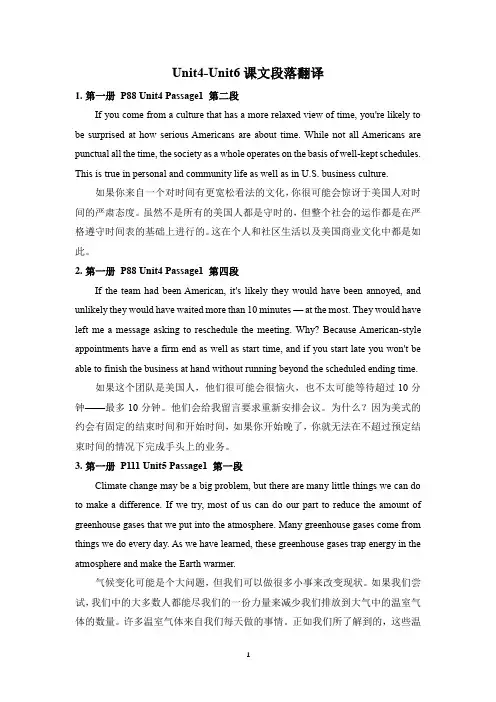
Unit4-Unit6课文段落翻译1.第一册P88 Unit4 Passage1 第二段If you come from a culture that has a more relaxed view of time, you're likely to be surprised at how serious Americans are about time. While not all Americans are punctual all the time, the society as a whole operates on the basis of well-kept schedules. This is true in personal and community life as well as in U.S. business culture.如果你来自一个对时间有更宽松看法的文化,你很可能会惊讶于美国人对时间的严肃态度。
虽然不是所有的美国人都是守时的,但整个社会的运作都是在严格遵守时间表的基础上进行的。
这在个人和社区生活以及美国商业文化中都是如此。
2.第一册P88 Unit4 Passage1 第四段If the team had been American, it's likely they would have been annoyed, and unlikely they would have waited more than 10 minutes — at the most. They would have left me a message asking to reschedule the meeting. Why? Because American-style appointments have a firm end as well as start time, and if you start late you won't be able to finish the business at hand without running beyond the scheduled ending time.如果这个团队是美国人,他们很可能会很恼火,也不太可能等待超过10分钟——最多10分钟。
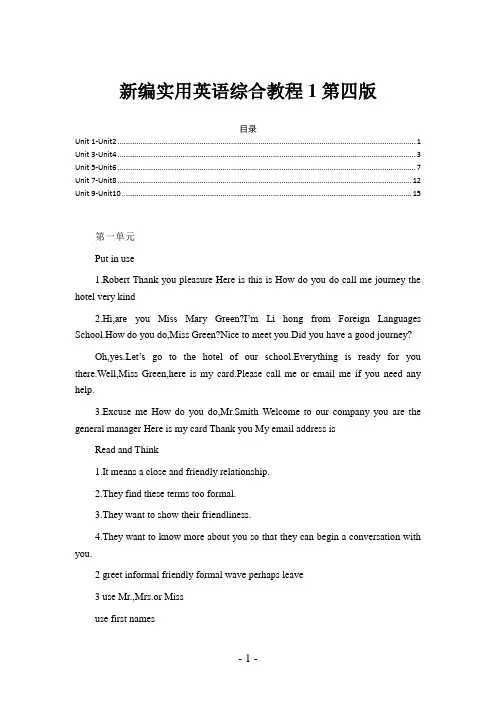
新编实用英语综合教程1第四版目录Unit 1-Unit2 (1)Unit 3-Unit4 (3)Unit 5-Unit6 (7)Unit 7-Unit8 (12)Unit 9-Unit10 (15)第一单元Put in use1.Robert Thank you pleasure Here is this is How do you do call me journey the hotel very kind2.Hi,are you Miss Mary Green?I’m Li hong from F oreign Languages School.How do you do,Miss Green?Nice to meet you.Did you have a good journey?Oh,yes.Let’s go to the hotel of our school.Everything is ready for you there.Well,Miss Green,here is my card.Please call me or email me if you need any help.3.Excuse me How do you do,Mr.Smith Welcome to our company you are the general manager Here is my card Thank you My email address isRead and Think1.It means a close and friendly relationship.2.They find these terms too formal.3.They want to show their friendliness.4.They want to know more about you so that they can begin a conversation with you.2 greet informal friendly formal wave perhaps leave3 use Mr.,Mrs.or Missuse first namescall me Sallyglad/happyinformal/friendlyd has left prefer personal accept means Speaking ofget to know acquainted with5.It is my impression that a typical English gentleman often takes an umbrella with him.To the students,the introduction to the cultural background is the best part of the book.When we talk with a foreign lady,in most cases we should not ask such personal questions as her age.Many young people prefer pop songs to old songs.They think pop singers are very cool.This beautiful and clean city has left a deep impression upon the foreign tourists.Professor L u Yang stood on the plane’s entrance and waved good-bye to us.6.We often express our happiness with a smile.She often speaks with a strong local accent.Similarly,Professor Green couldn’t bear laziness.Similarly,they don’t want to rely on others.Speaking of En glish,I’ve got to go to class.Speaking of business cards,I’ve got to print some more now.In China,family relationships are usually rather close.In my hometown,companies are usually rather small.These boys prefer football to basketball.I prefer Chinese food to Western food.Such an ending may be too hasty to me.Such weather may be too hot to the tourists.Read and Judge7.F F T F T T T F F T9.欢迎来到中华文化俱乐部。